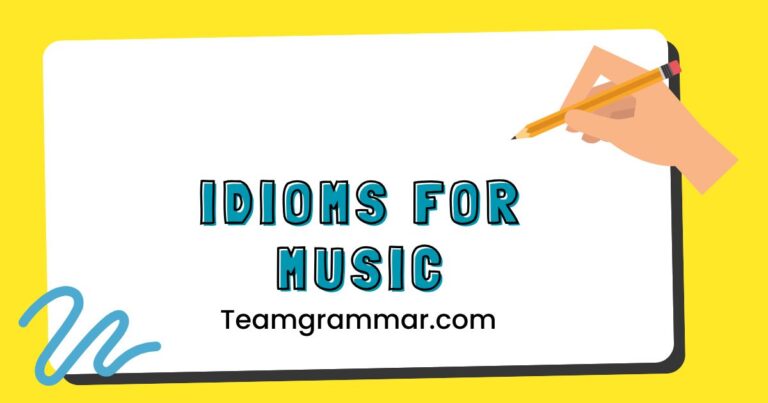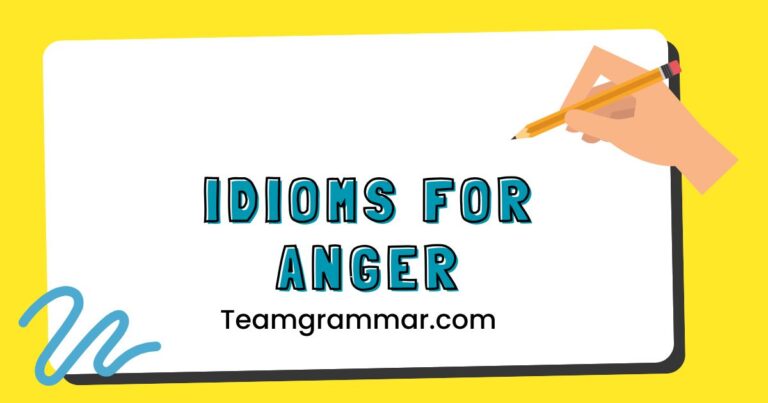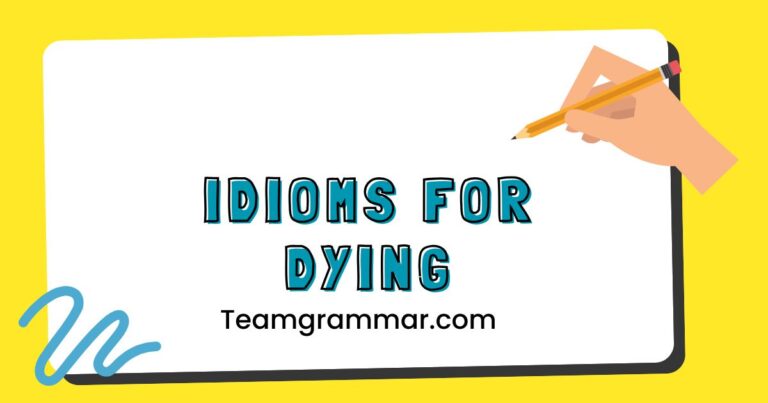45 Idioms for Failure: Mastering Figurative Language
Understanding idioms is crucial for mastering English, especially when discussing nuanced concepts like failure. Idioms add color and depth to communication, allowing native speakers to express complex ideas concisely and creatively.
For English language learners, recognizing and using idioms related to failure can significantly enhance comprehension and fluency. This article provides a comprehensive guide to idioms about failure, exploring their meanings, structures, and usage, making it an invaluable resource for students at all proficiency levels.
This guide is designed for English language learners, ESL/EFL teachers, and anyone interested in expanding their knowledge of English idioms. By the end of this article, you will have a solid understanding of various idioms related to failure, enabling you to use them confidently in both spoken and written English.
Table of Contents
- Introduction
- Definition of Idioms for Failure
- Structural Breakdown of Idioms
- Types and Categories of Failure Idioms
- Examples of Idioms for Failure
- Usage Rules for Failure Idioms
- Common Mistakes with Failure Idioms
- Practice Exercises
- Advanced Topics
- FAQ
- Conclusion
Definition of Idioms for Failure
An idiom is a phrase or expression whose meaning cannot be understood from the literal meanings of its individual words. Instead, it has a figurative meaning that is culturally specific.
Idioms for failure are phrases that describe situations, actions, or outcomes that result in a lack of success, achievement, or fulfillment. These idioms often convey a sense of disappointment, frustration, or even humor, depending on the context.
Idioms are classified as a type of figurative language, which also includes metaphors, similes, and personification. Their function is to add color, emphasis, and emotional depth to communication.
They appear frequently in everyday speech, literature, and media, making their understanding essential for effective communication. The context in which an idiom is used is crucial for its interpretation.
The same idiom can have different nuances depending on the situation and the speaker’s intention.
Structural Breakdown of Idioms
Idioms, by definition, defy straightforward structural analysis. Their meaning isn’t derived from the sum of their parts.
However, understanding the components can aid in memorization and usage. Many idioms follow common grammatical structures, such as verb phrases, prepositional phrases, or even complete clauses.
Recognizing these underlying structures can help learners identify and remember idioms more easily.
For instance, the idiom “to go down in flames” follows a verb phrase structure. “To bite the dust” is another example of a common verb phrase pattern found in many idioms relating to failure.
Other idioms might be structured as similes, like “as dead as a doornail,” emphasizing the finality of failure. The idiomatic meaning often overrides the literal grammatical correctness.
For example, “miss the boat” doesn’t literally involve a boat; it signifies missing an opportunity.
Types and Categories of Failure Idioms
Idioms for failure can be categorized based on the specific area of life or context in which the failure occurs. This categorization helps in understanding the nuances of each idiom and using it appropriately.
Economic Failure
These idioms describe financial losses, business failures, or economic downturns. They often involve images of sinking, collapsing, or losing money.
Academic Failure
This category includes idioms related to failing exams, not meeting academic standards, or struggling with studies. They often evoke feelings of frustration and disappointment.
Relationship Failure
These idioms describe the end of romantic relationships, friendships, or other interpersonal connections. They often involve images of breaking, falling apart, or drifting away.
Personal Failure
This category includes idioms related to failing to achieve personal goals, making mistakes, or not living up to one’s potential. These idioms often carry a sense of regret or self-criticism.
Project Failure
These idioms describe situations where projects, plans, or endeavors do not succeed. They often involve images of crashing, stalling, or going wrong.
Examples of Idioms for Failure
The following sections provide extensive examples of idioms for failure, categorized by type. Each example is accompanied by a definition and a sample sentence to illustrate its usage.
General Failure Examples
This table provides examples of idioms that can be used to describe failure in a general sense, without being specific to a particular area.
| Idiom | Definition | Example Sentence |
|---|---|---|
| Go down in flames | To fail spectacularly and disastrously. | The company’s stock price went down in flames after the scandal was revealed. |
| Bite the dust | To fail or die; to come to an end. | Many small businesses bit the dust during the economic recession. |
| Fall flat | To fail to produce the intended effect or result. | His jokes fell flat, and the audience remained silent. |
| Miss the boat | To miss an opportunity. | If you don’t apply now, you’ll miss the boat. |
| Draw a blank | To fail to remember something. | I drew a blank when the teacher asked me about the capital of Australia. |
| Come to naught | To come to nothing; to fail. | All his efforts to save the company came to naught. |
| End in smoke | To come to nothing. | Their grand plans for the summer ended in smoke when the pandemic hit. |
| Go belly up | To fail completely, especially financially. | The restaurant went belly up after only six months in business. |
| Go south | To decline or deteriorate. | The negotiations went south when they couldn’t agree on the terms. |
| Run aground | To fail; to come to an end. | Their marriage ran aground after years of unresolved conflicts. |
| Go pear-shaped | To go wrong; to fail. | The party went pear-shaped when the police arrived. |
| Flop | To be completely unsuccessful. | The movie was a flop, and the studio lost millions. |
| Bomb | To fail completely. | The comedian’s performance bombed, and he left the stage early. |
| Tank | To fail badly. | The company’s stock price tanked after the bad news. |
| Crash and burn | To fail spectacularly. | His attempt to climb the mountain crashed and burned due to the severe weather. |
| Lay an egg | To fail to perform well. | The team laid an egg in the championship game. |
| Go to pot | To decline or deteriorate. | The old house has gone to pot since the new owners took over. |
| Be a washout | To be a complete failure. | The new product was a washout, and the company discontinued it. |
| Come a cropper | To fail badly. | The business came a cropper when the economy crashed. |
| Fall by the wayside | To fail to continue; to be abandoned. | Many of their early ideas fell by the wayside as the project progressed. |
| Not cut the mustard | To fail to meet expectations or standards. | He didn’t cut the mustard in the interview, so he didn’t get the job. |
| Go up in smoke | To disappear or fail completely. | His dreams of becoming a professional athlete went up in smoke after his injury. |
| Be dead in the water | To be certain to fail; to be no longer viable. | The project was dead in the water after the funding was withdrawn. |
Economic Failure Examples
This table focuses on idioms that specifically describe financial or business failures.
| Idiom | Definition | Example Sentence |
|---|---|---|
| Go bankrupt | To be declared legally unable to pay debts. | The company went bankrupt after years of financial mismanagement. |
| Lose one’s shirt | To lose a large amount of money. | He lost his shirt in the stock market crash. |
| Go bust | To become bankrupt or fail financially. | Many businesses went bust during the recession. |
| Be in the red | To be in debt or losing money. | The company has been in the red for the past three quarters. |
| Go to the wall | To fail financially. | Many small businesses went to the wall during the pandemic. |
| Be on the rocks | To be in a difficult or unstable situation, especially financially. | The company was on the rocks due to the poor sales figures. |
| Go under | To fail financially; to go out of business. | The restaurant went under because it couldn’t attract enough customers. |
| Be a dead loss | To be completely worthless or unprofitable. | The investment turned out to be a dead loss. |
| Break the bank | To use up all of one’s savings. Often used in the negative sense, like “It won’t break the bank.” | Buying a used car won’t break the bank. |
| Be cleaned out | To lose all of one’s money or possessions. | He was cleaned out by the gambling addiction. |
| Go to the dogs | To decline or deteriorate in condition or quality. | The neighborhood has gone to the dogs since the factory closed. |
| Be left holding the bag | To be left with the responsibility for something that has gone wrong. | After the deal fell through, he was left holding the bag. |
| Go down the drain | To be wasted or lost. | All the money they invested went down the drain. |
| Be a sinking ship | A business or organization that is failing and likely to collapse. | The company is a sinking ship, and many employees are looking for new jobs. |
| Be in dire straits | To be in a very difficult situation, especially financially. | The family was in dire straits after losing their home. |
| Tighten one’s belt | To spend less money because you have less money than you used to. | We had to tighten our belts when my husband lost his job. |
| Cannot make ends meet | To not have enough money to pay for basic expenses. | Many families are struggling to make ends meet due to the rising cost of living. |
| Be strapped for cash | To not have enough money. | We’re a little strapped for cash at the moment, so we can’t afford a vacation. |
| Be on a shoestring budget | To have very little money to spend. | The film was made on a shoestring budget. |
Academic Failure Examples
This table lists idioms that relate to failing in an academic context, such as school or university.
| Idiom | Definition | Example Sentence |
|---|---|---|
| Flunk out | To fail and be forced to leave school or university. | He flunked out of college after failing several courses. |
| Bomb a test | To fail a test completely. | I bombed the chemistry test because I didn’t study enough. |
| Fall behind | To fail to keep up with the required work or progress. | She fell behind in her studies after missing several weeks of school. |
| Not make the grade | To fail to reach the required standard. | He didn’t make the grade in the final exam. |
| Draw a blank | To be unable to remember something, especially in an exam. | I drew a blank when the teacher asked me about the French Revolution. |
| Be a slow learner | To learn things more slowly than others. | He was a slow learner, but he eventually mastered the material. |
| Get a failing grade | To receive a grade that indicates failure. | She got a failing grade on her essay. |
| Stumble | To make a mistake or error, especially in speech or performance. | He stumbled during his presentation, but he quickly recovered. |
| Miss the mark | To fail to achieve a goal or standard. | His essay missed the mark because it didn’t address the main topic. |
| Not pass muster | To fail to meet the required standards. | His research paper didn’t pass muster, so he had to revise it. |
| Be at the bottom of the class | To be the worst-performing student in a class. | He was always at the bottom of the class in math. |
| Struggle with | To have difficulty with something. | She struggled with the calculus problems. |
| Fall short | To fail to reach a goal or standard. | His efforts fell short of what was needed to pass the course. |
| Be out of one’s depth | To be in a situation that is too difficult to handle. | He was out of his depth in the advanced physics class. |
Relationship Failure Examples
The idioms in this table relate to the breakdown of relationships, whether romantic, platonic, or familial.
| Idiom | Definition | Example Sentence |
|---|---|---|
| Break up | To end a romantic relationship. | They decided to break up after five years together. |
| Fall apart | To disintegrate or fail, especially in a relationship. | Their marriage fell apart after years of conflict. |
| Drift apart | To gradually become less close to someone. | They drifted apart after she moved to another city. |
| Go sour | To become unpleasant or unsuccessful. | Their friendship went sour after the argument. |
| Hit the rocks | To encounter serious problems, especially in a relationship. | Their relationship hit the rocks when he lost his job. |
| Be on the outs | To be on bad terms with someone. | They were on the outs after the misunderstanding. |
| Call it quits | To end a relationship or activity. | They decided to call it quits after trying to reconcile. |
| Go separate ways | To end a relationship and live separate lives. | They decided to go their separate ways after years of unhappiness. |
Personal Failure Examples
This table includes idioms that describe personal shortcomings, mistakes, or failures to achieve personal goals.
| Idiom | Definition | Example Sentence |
|---|---|---|
| Drop the ball | To make a mistake or fail to do something important. | He dropped the ball by forgetting to send the email. |
| Fall short of expectations | To fail to meet the required standards or hopes. | His performance fell short of expectations. |
| Not live up to potential | To fail to achieve as much as one is capable of. | He didn’t live up to his potential due to his lack of motivation. |
| Make a mess of | To do something badly or create problems. | He made a mess of the presentation. |
| Come undone | To fail or collapse, especially due to stress or pressure. | He came undone after the stressful project. |
| Go off the rails | To start behaving in a wild or unacceptable way. | He went off the rails after losing his job. |
| Hit a brick wall | To reach a point where one cannot make further progress. | He hit a brick wall in his career. |
| Be a recipe for disaster | To be very likely to result in failure or problems. | His plan was a recipe for disaster. |
Usage Rules for Failure Idioms
Using idioms correctly requires understanding their specific context and nuances. While idioms add color to your language, using them inappropriately can lead to misunderstandings or sound unnatural.
Here are some key rules to follow:
- Context is Key: Always consider the context in which you’re using an idiom. Ensure that the situation aligns with the idiom’s meaning.
- Audience Awareness: Be mindful of your audience. Idioms are often culturally specific, and not everyone may understand them. In formal or international settings, it’s best to use more straightforward language.
- Grammatical Consistency: While idioms themselves might not follow standard grammatical rules, ensure that the surrounding sentence structure is correct. For example, if an idiom is a verb phrase, conjugate the verb correctly.
- Overuse Avoidance: Don’t overuse idioms. Too many idioms in a short span can make your language sound forced and unnatural.
- Literal vs. Figurative: Always remember that idioms have a figurative meaning, not a literal one. Avoid interpreting them literally.
Exceptions to these rules are rare, but they can occur in creative writing or humorous contexts where the deliberate misuse of an idiom can create a specific effect. However, for general communication, it’s best to adhere to these guidelines.
Common Mistakes with Failure Idioms
Here are some common mistakes that learners make when using idioms, along with corrections:
| Incorrect | Correct | Explanation |
|---|---|---|
| He missed the train to get the job. | He missed the boat to get the job. | “Miss the boat” refers to missing an opportunity, not a literal train. |
| The company went down with fire. | The company went down in flames. | The correct idiom is “go down in flames,” not “with fire.” |
| They fell apart each other. | They fell apart. | “Fall apart” doesn’t need “each other” as it’s an intransitive verb in this context. |
| He dropped the ball on the email. | He dropped the ball by forgetting to send the email. | It’s better to explain *how* the ball was dropped for clarity. |
| The plan was a recipe for a good thing. | The plan was a recipe for disaster. | “A recipe for disaster” implies something negative, the opposite of “a good thing”. |
| She is in the red color. | She is in the red. | The idiom “in the red” already implies financial difficulty; “color” is redundant. |
| He hit a wall of bricks. | He hit a brick wall. | The correct idiom is “hit a brick wall,” not “a wall of bricks.” |
| They called it to quit. | They called it quits. | The correct idiom is “call it quits,” not “call it to quit.” |
Practice Exercises
Test your understanding of failure idioms with these exercises.
Exercise 1: Fill in the Blanks
Choose the correct idiom from the list to complete each sentence:
- missed the boat
- went belly up
- fell flat
- dropped the ball
- hit the rocks
| Question | Answer |
|---|---|
| 1. The joke __________ because the audience didn’t understand the reference. | fell flat |
| 2. The company __________ after the scandal was revealed. | went belly up |
| 3. He __________ by forgetting to book the venue for the conference. | dropped the ball |
| 4. They __________ when they decided to postpone the project indefinitely. | missed the boat |
| 5. Their relationship __________ after years of unresolved conflicts. | hit the rocks |
Exercise 2: Matching
Match the idiom with its correct definition:
| Idiom | Definition |
|---|---|
| 1. Go south | a. To fail to meet expectations |
| 2. Not cut the mustard | b. To fail completely |
| 3. Go to pot | c. To decline or deteriorate |
| 4. Be a washout | d. To be a complete failure |
Answers:
- 1-c
- 2-a
- 3-c
- 4-d
Exercise 3: Sentence Completion
Complete the sentences using an appropriate idiom:
| Question | Answer |
|---|---|
| 1. Despite his best efforts, his plans to save the company __________. | came to naught. |
| 2. After the disastrous launch, the product was __________. | dead in the water. |
| 3. Due to the economic downturn, many families are struggling to __________. | make ends meet. |
| 4. His dreams of becoming a professional athlete __________ after his injury. | went up in smoke. |
| 5. The project __________ when the funding was withdrawn unexpectedly. | ran aground. |
| 6. The negotiations __________ when they couldn’t agree on the terms. | went south |
| 7. Many small businesses __________ during the pandemic. | went to the wall |
| 8. She __________ on the exam because she didn’t study. | bombed the test. |
| 9. They decided to __________ after several years of unhappiness. | go their separate ways. |
| 10. He __________ when he forgot to submit the report on time. | dropped the ball. |
Advanced Topics
For advanced learners, exploring the etymology and cultural context of idioms can provide a deeper understanding. Many idioms have historical roots that reflect past societal norms, occupations, or events.
Researching the origins of idioms can reveal fascinating insights into the evolution of language and culture. Additionally, understanding the regional variations of idioms can enhance communication skills in diverse settings.
Some idioms are more common in certain countries or regions, and using them appropriately demonstrates cultural awareness.
Furthermore, analyzing the use of idioms in literature and media can provide valuable examples of how they are used effectively. Pay attention to how authors and speakers use idioms to convey specific emotions, create vivid imagery, and engage their audience.
This type of analysis can help you develop a more nuanced understanding of idioms and improve your ability to use them creatively and effectively.
FAQ
- What is an idiom?
An idiom is a phrase or expression whose meaning cannot be understood from the literal meanings of its individual words. It has a figurative meaning that is culturally specific.
- Why is it important to learn idioms?
Learning idioms is crucial for understanding and communicating effectively in English. Idioms add color and depth to language and are frequently used in everyday speech, literature, and media.
- How can I learn idioms more effectively?
To learn idioms effectively, focus on understanding their context, using them in sentences, and practicing regularly. Reading English literature, watching movies, and engaging in conversations with native speakers can also help.
- Are idioms the same in all English-speaking countries?
No, idioms can vary significantly between different English-speaking countries. Some idioms are specific to certain regions or cultures, so it’s important to be aware of these variations.
- Can I use idioms in formal writing?
It depends on the context of the formal writing. In general, it’s best to avoid idioms in highly formal or academic writing. However, in less formal contexts, such as business communications, idioms can be appropriate if used sparingly and appropriately.
- What should I do if I don’t understand an idiom?
If you don’t understand an idiom, try to ask for clarification from a native speaker or consult a dictionary of idioms. Understanding the context in which the idiom is used can also provide clues to its meaning.
- Is it possible to overuse idioms?
Yes, it is possible to overuse idioms. Using too many idioms in a short span can make your language sound forced and unnatural. It’s best to use idioms sparingly and appropriately.
- Are there any resources I can use to learn more about idioms?
Yes, there are many resources available for learning about idioms, including dictionaries of idioms, online websites, and language learning apps. Reading English literature and watching movies can also help you learn idioms in context.
- How do I avoid misusing idioms?
To avoid misusing idioms, pay close attention to their context, meaning, and usage. Practice using them in sentences and get feedback from native speakers. Avoid using idioms if you’re unsure of their meaning or appropriateness.
- What is the difference between an idiom and a proverb?
An idiom is a phrase whose meaning is not predictable from the usual meanings of its constituent elements, while a proverb is a short, well-known saying that expresses a general truth or piece of advice. Proverbs often offer wisdom or guidance, while idioms are more about figurative expression.
Conclusion
Mastering idioms for failure is an essential step in achieving fluency and cultural competence in English. By understanding the definitions, structures, and usage rules of these idioms, learners can enhance their comprehension, communication, and overall language proficiency.
Remember to practice regularly, pay attention to context, and be mindful of your audience when using idioms. With consistent effort and attention to detail, you can confidently incorporate these colorful expressions into your everyday English.
The journey to mastering English idioms can be challenging but also rewarding. By continuously expanding your vocabulary, exploring the cultural context of idioms, and practicing their usage in various situations, you will not only improve your language skills but also gain a deeper appreciation for the richness and diversity of the English language.
Keep learning, keep practicing, and enjoy the process of discovering new and exciting ways to express yourself.







